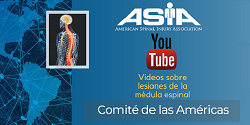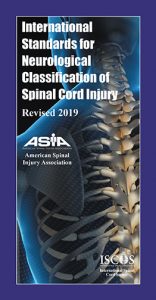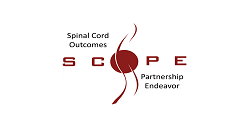.

As the leading resource for peer-reviewed State-of-the-Science information on Spinal Cord Injury and Disease, Topics in Spinal Cord Injury Rehabilitation (TSCIR) is an interdisciplinary journal devoted to the study and dissemination of practical and theoretical information related to the subject of Spinal Cord Injury Rehabilitation.
TSCIR ANNOUNCEMENTS:
April, 2025 • Call for Papers!
Special issue on:
Artificial Intelligence in Spinal Cord Injury Research and Medicine
Guest Editor: Dennis Bourbeau
Manuscripts due by January 9, 2026
TSCIR Submission Details
Artificial intelligence (AI) is a quickly growing area with many applications. Large language models (LLMs) are being used to take notes during meetings and appointments, to summarize themes from text, and to accelerate qualitative research. Machine learning tools are being used to find patterns in large, complex data sets, which can generate new hypotheses and provide new insights. These new opportunities are supported by the increasingly available data sets. The NIH now mandates that data collected via funded projects be published in repositories, and funders are publishing requests for applications for projects that focus on analysis of large data sets. Given this trend, there is an important opportunity for incorporating AI tools into SCI research and medicine.
The purpose of this special issue is to illustrate new, innovative approaches of using AI tools in SCI research and medicine. It will stimulate discussion about the use of AI tools, and the readership will also be able to consider new questions and ideas that could be explored using these emerging tools. They will learn about how to define their questions in ways that leverage these tools and be able to understand and evaluate findings from AI models. We invite papers to this special issue that address this topic.
Some examples of topics might include papers that:
– use machine learning tools to analyze an SCI clinical data set
– use an LLM in a qualitative research study
– analyze a dataset using an AI tool in order to provide a new insight in SCI research
Submission Timeline: We ask that authors submit manuscripts by January 9, 2026.
March, 2025 • Join the TSCIR Editorial Board!
Topics in Spinal Cord Injury Rehabilitation (TSCIR) seeks additional Editorial Board members for its editorial team.
As the leading resource for peer-reviewed state-of-the-science information on spinal cord injury and disease, TSCIR is an interdisciplinary journal devoted to the study and dissemination of practical and theoretical information related to the subject of spinal cord injury rehabilitation
Editorial Board members support TSCIR and its editorial team by providing at least four objective and thoughtful manuscript reviews per year and actively participate in quarterly editorial board meetings to ensure the growth and scientific rigor of the Journal. Editorial Board members serve for two-year terms with option to renew.
Individuals interested in serving as an Editorial Board member are asked to submit a CV and brief letter of interest to the Editors-in-Chief, Drs. Monica Perez and Kathy Zebracki, to the ASIA TSCIR office: TSCIR@asia-spinalinjury.org.
All questions and requests for additional information can be sent to the Editors. Review of applications will begin April 15, 2025.
November, 2024 • Call for Papers!
Special issue on:
Evidence-based Recommendations for Exercise-Intervention studies involving people with Spinal Cord Injury
Guest Editors: Kathleen Martin Ginis, Matteo Ponzano, Mark Nash
Manuscripts due by July 8, 2025
TSCIR Submission Details
The number of published exercise trials in people living with spinal cord injury (PwSCI) has grown exponentially over the past five decades. However, the trials often have methodological limitations, which affect the quality and the clinical relevance of the research. For instance, a systematic review of 211 exercise studies involving PwSCI detected serious or very serious risk of bias for all outcomes of interest (i.e., cardiorespiratory fitness, power output, muscle strength, cardiovascular disease, and bone health). Such potential for bias negatively affects the certainty of the evidence of exercise-intervention research with PwSCI and the confidence with which clinicians and scientists can make recommendations about using exercise to improve health outcomes in PwSCI.
Recently, an international team of authors used a consensus-based process to formulate a set of 33 recommendations for conducting exercise-intervention research involving PwSCI1[1]. The recommendations can be found here.
The recommendations address elements such as participant recruitment, outcome measurement, exercise intervention prescription and delivery, supporting adherence to the intervention, fidelity of the delivery of the intervention, and monitoring and reporting adverse events. It is expected that adopting these recommendations will increase the quality and the overall certainty of the evidence regarding the effects of exercise on health outcomes in PwSCI.
The purpose of this special issue is to provide detailed guidance on how to follow the recommendations. For example, the recommendations outline what should be measured in exercise trials, but they do not explain how to conduct these assessments; the recommendations advise meaningfully engaging people with SCI in the design of studies, but do not explain how to do this effectively. We invite papers to this special issue that address these, and other questions of how to conduct high-quality SCI exercise research in a manner that aligns with the newly developed recommendations.
Some examples of topics might include papers that:
– present new methods for conducting fitness and other outcome assessments in field settings
– address reliability and validity of outcome measures in people with SCI
– valuate approaches for assessing implementation of research protocols
– test methods for improving adherence and retention in exercise trials
– discuss strategies for meaningful engagement of people with lived experience of SCI in the research process and research co-production
– describe innovative quantitative and qualitative methodologies that will improve the quality of exercise trials involving people with SCI
Submission Timeline: We ask that authors submit manuscripts by July 8, 2025.
Important Submission Notes
If you are submitting to the special issue on Evidence-based Recommendations for Exercise-Intervention studies involving people with Spinal Cord Injury please include a cover letter that outlines which aspects of the Recommendations are addressed in your paper, and how your paper meets the focus of this special issue: how to conduct high-quality SCI exercise research in a manner that aligns with the newly developed recommendations. Papers that do not meet the call, will not be considered for the special issue
Direct all inquiries and letters of intent to TSCIR’s office: TSCIR_editor@asia-spinalinjury.org








